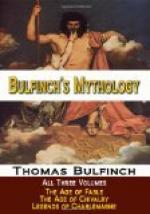Horrible to the Emperor’s eyes was the sight of the field of Roncesvalles. The Saracens indeed had fled, conquered; but all his paladins but two were left on it dead, and the whole valley looked like a great slaughter-house, trampled into blood and dirt, and reeking to the heat. Charles trembled to his heart’s core for wonder and agony. After gazing dumbly on the place he cursed it with a solemn curse, and wished that never grass might grow in it again, nor seed of any kind, neither within it nor on any of its mountains around, but the anger of Heaven abide over it forever.
Charles and his warriors went after the Saracens into Spain. They took and fired Saragossa, and Marsilius was hung to the carob-tree under which he had planned his villainy with Gan; and Gan was hung and drawn and quartered in Roncesvalles, amidst the execrations of the country.
RINALDO AND BAYARD
Charlemagne was overwhelmed with grief at the loss of so many of his bravest warriors at the disaster of Roncesvalles, and bitterly reproached himself for his credulity in resigning himself so completely to the counsels of the treacherous Count Gan. Yet he soon fell into a similar snare when he suffered his unworthy son, Charlot, to acquire such an influence over him, that he constantly led him into acts of cruelty and injustice that in his right mind he would have scorned to commit. Rinaldo and his brothers, for some slight offence to the imperious young prince, were forced to fly from Paris, and to take shelter in their castle of Montalban; for Charles had publicly said, if he could take them he would hang them all. He sent numbers of his bravest knights to arrest them, but all without success. Either Rinaldo foiled their efforts and sent them back, stripped of their armor and of their glory, or, after meeting and conferring with him, they came back and told the king they could not be his instruments for such a work.
At last Charles himself raised a great army, and went in person to compel the paladin to submit. He ravaged all the country round about Montalban, so that supplies of food should be cut off, and he threatened death to any who should attempt to issue forth, hoping to compel the garrison to submit for want of food.
Rinaldo’s resources had been brought so low that it seemed useless to contend any longer. His brothers had been taken prisoners in a skirmish, and his only hope of saving their lives was in making terms with the king.
So he sent a messenger, offering to yield himself and his castle if the king would spare his and his brothers’ lives. While the messenger was gone Rinaldo, impatient to learn what tidings he might bring, rode out to meet him. When he had ridden as far as he thought prudent he stopped in a wood, and alighting, tied Bayard to a tree. Then he sat down, and, as he waited, he fell asleep. Bayard meanwhile got loose, and strayed away where the grass tempted him. Just then came along some country people, who said to one another, “Look, is not that the great horse Bayard that Rinaldo rides? Let us take him, and carry him to King Charles, who will pay us well for our trouble.” They did so, and the king was delighted with his prize, and gave them a present that made them rich to their dying day.




